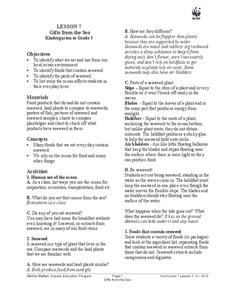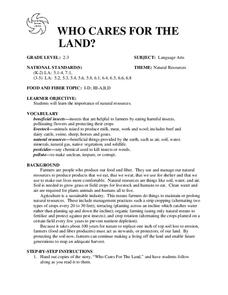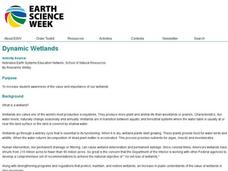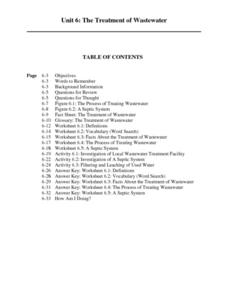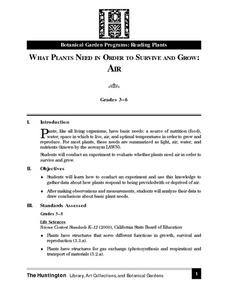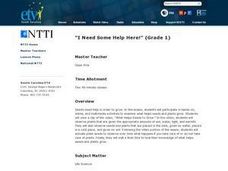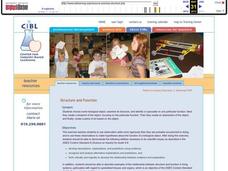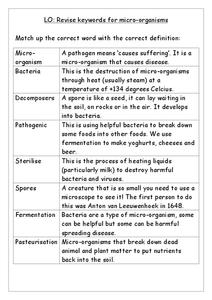Curated OER
Gifts from the Sea
Students discover the oceanic food chain. In this healthy eating lesson, student investigate the fish we eat and the food the fish eat. Students discover what ocean animals eat seaweed and what everyday foods we eat that also...
Curated OER
Gifts from the Sea
Students investigate parts of the ocean. For this seaweed lesson, students identify foods that contain seaweed, parts of seaweed, and how the ocean affects our lives. As a class students brainstorm ways we rely on the ocean and compare...
Curated OER
WHO CARES FOR THE LAND?
Students explore the importance of natural resources. They are given copies of the story, "Who Cares For The Land," and students follow
along as the teacher reads it. Students identify the key points in the story. (Soil, water and air...
Curated OER
Dynamic Wetlands
High schoolers construct and observe a model of two different types of wetlands. In this wetlands lesson, students create a model of a wetland with constant drainage and a wetland that maintains a well-saturated soil. High schoolers...
Curated OER
Now You See It, Now You Don't
Students explore organic and inorganic objects. In this environmental lesson plan students perform a composting experiment using flowers in different soils. Students record their observations.
Curated OER
Worm Compost & Vermicomposting
Students explore vermicomposting, the species of worms needed and the proper climate for it. In this composting lesson students make their own worm compost bin.
Curated OER
Food Chains and Food Webs
For this biology worksheet, students read about food chains and food webs. They then answer 4 questions regarding the information they just learned. The answers are on the last page in the packet.
Curated OER
What is an Earthworm Like?
Second graders study earthworms. In this science lesson, 2nd graders observe an earthworm using a magnifying lens, draw pictures of the earthworm, and record their observations.
Curated OER
The Treatment of Wastewater
Students, through a series of lessons, study the various processes of treating wastewater. They participate in discussion and complete various worksheets and a hands-on activity, in which they observe the processes of filtration and...
Curated OER
Bog Science
Students study bogs. They tour, collect physical, chemical, and biological data and analyze a pristine bog community. Using the data, they draw a map and a cross section of the bog.
Curated OER
Make your Garden Grow
Fourth graders role play as certified horticulturists as they study the biology of plants and gardening. They design a garden for their school based on what they researched and a given budget.
Curated OER
4-H Horticulture/Garden Activity Page
As part of an exploration of plants, learners engage in projects to design greenhouses, grow vegetables, and other endeavors. This 20 question activity packet could be used as a classroom mini-lesson or as the start to a long-term project.
Curated OER
Zoo Poo
Learners use Internet research to determine the amount of carbon dioxide produced per unit energy for biomass and coal. For this alternative energy lesson, students research to find out how much energy and carbon dioxide several coal and...
Curated OER
Where Do Your Veggies Grow?
Students examine the different ways fruits and vegetables are grown. In this vegetable growth instructional activity students are presented with the three ways that the vegetation occurs: leaves, roots, or branches. The students group...
Curated OER
Finding Fungi in the World Around Us
These lesson ideas will help your students explore the diversity of Kingdom Fungi.
Curated OER
Food Chains, Food Webs, Biomass Pyramids and Cycle
In this food chain instructional activity, students review terms associated with food chains and food webs. Students also recall the water cycle.
Curated OER
Earth Day
Students participate in activities that familiarize them with what Earth Day is, why it is important, and why it is a celebration.
Curated OER
Carbohydrates-Simple and Complex
Grain products are staple foods and sources of simple and complex carbohydrates that provide energy for the body. Define simple and complex carbohydrates Identify function and sources of simple and complex carbohydrates Describe how...
Curated OER
What Plants Need in Order to Survive and Grow: Air
Students conduct an experiment to determine whether plants need air in order to survive and grow. They discuss natural resources, analyze slides, and observe and record data from the experiment.
Curated OER
Monarch Migration
Third graders investigate the life cycle of the Monarch butterfly. They experiment with various tools to simulate the mouth parts of insects, conduct research, record their observations of butterflies hatching, write a play, complete...
Curated OER
I Need Some Help Here!
First graders describe what help seeds need to grow, including light, water, good soil, and warmth, observe and discuss what happens when seeds do not have help, and state similarities and differences among seed growth.
Curated OER
Structure and Function
Structure and Function
SynopsisStudents choose some biological object, examine its structure, and identify or speculate on one particular function. Next they create a blueprint of the object, focusing on the particular function. Then...
Curated OER
Observing Decomposition
In this science worksheet, students focus upon the concept of decomposition and collect data in order to make interpretations or observations.
Curated OER
Micro-Organisms
For this identifying the definitions of micro-organisms worksheet, students match the correct key words with the correct definitions. Students match 8 answers.
